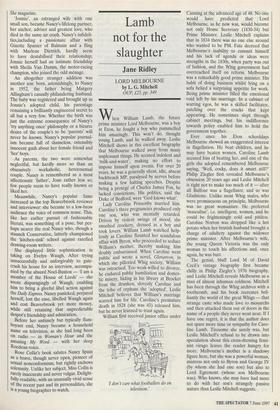Lamb not for the slaughter
Jane Ridley
LORD MELBOURNE by L. G. Mitchell OUP, £.25, pp. 349 When William Lamb, the future prime minister Lord Melbourne, was a boy at Eton, he fought a boy who pummelled him amazingly. This won't do, thought young Lamb, and he walked away. Leslie Mitchell shows in this excellent biography that Melbourne walked away from many unpleasant things. He seemed indolent and `milk-and-water', making no effort to impose himself upon events. For over 20 years, he was a generally silent, idle, absent backbench MP, paralysed by nerves before making a few halting speeches. Despite being a protégé of Charles James Fox, he lacked convictions. His politics, said the Duke of Bedford, were 'God knows what'.
Lady Caroline Ponsonby married him. Caroline's three pregnancies produced only one son, who was mentally retarded. Driven by violent swings of mood, she smashed crockery, dressed as a boy and took lovers. William Lamb watched help- lessly as Caroline flaunted her scandalous affair with Byron, who proceeded to seduce William's mother, thereby making him doubly embarrassed. When Caroline went public and wrote a novel, Glenarvon, in which she pilloried Whig society, William was ostracised. Too weak-willed to divorce, he endured public humiliation and domes- tic misery, hiding in his library at Brocket from the drunken, slovenly Caroline and the tribe of orphans she 'adopted'. Leslie Mitchell believes that William's marriage scarred him for life. Caroline's premature death in 1828 (she was 43) released him, but he never learned to trust again.
William first received junior office under 'I don't care what footballers do on television.' Canning at the advanced age of 48. No one would have predicted that Lord Melbourne, as he now was, would become not only Home Secretary (1830-34) but Prime Minister. Leslie Mitchell explains that in 1834 there was no one else around who wanted to be PM. Fate decreed that Melbourne's inability to commit himself and his lack of agenda or ideas were strengths in the 1830s, when party was out of fashion, and the Whig government had overreached itself on reform. Melbourne was a remarkably good prime minister. His habit of doing business whilst lying on a sofa belied a surprising appetite for work. Being prime minister filled the emotional void left by his marriage. In a cabinet of warring egos, he was a skilled facilitator, patching over the cracks that kept appearing. He sometimes slept through cabinet meetings, but his indifference towards policy enabled him to hold the government together.
Ever since his Eton schooldays Melbourne showed an exaggerated interest in flagellation. He beat children, and he may have beaten women. Caroline Lamb accused him of beating her, and one of the girls she adopted remembered Melbourne saying, 'Well, cocky, does it smart still?' Philip Ziegler first revealed Melbourne's obsession 20 years ago and Leslie Mitchell is right not to make too much of it — after all Balfour was a flagellator, and so was Gladstone. Unlike most Whig males, who were promiscuous on principle, Melbourne was no great womaniser. He preferred 'masculine', i.e. intelligent, women, and he could be frighteningly cold and pitiless. Caroline Norton was dropped like a hot potato when her brutish husband brought a charge of adultery against the widower prime minister. After Melbourne's wife, the young Queen Victoria was the only woman to touch his affections and, once again, he was hurt.
The genial, bluff Lord M of David Cecil's vintage biography first became chilly in Philip Ziegler's 1976 biography, and Leslie Mitchell reveals Melbourne as a man of almost inhuman coldness. Mitchell has been through the Whig archives with a toothcomb, and his book recreates bril- liantly the world of the great Whigs — that strange caste who made love to monarchs and then attacked them out of doors in the name of a people they never went near. If I have one regret, it is that the author does not spare more time or sympathy for Caro- line Lamb. Tiresome she surely was, but Leslie Mitchell's refusal to be drawn into speculation about this cross-dressing femi- nist virago leaves the reader hungry for more. Melbourne's mother is a shadowy figure here, but she was a powerful woman, mistress not only to Byron and George IV (by whom she had one son) but also to Lord Egremont (whose son Melbourne was). Who knows, she may have had more to do with her son's strangely passive nature than Leslie Mitchell suggests.










































































 Previous page
Previous page